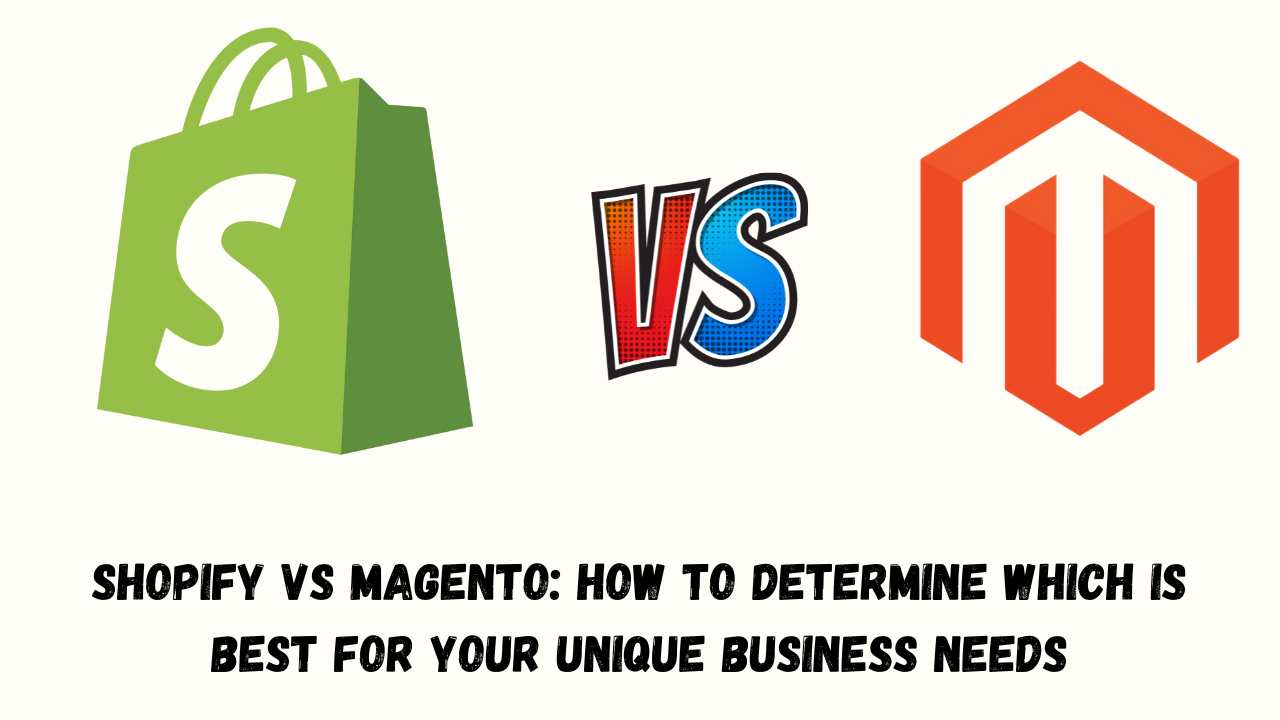Are you trying to launch an online store, but can't decide between Shopify and Magento? eCommerce platforms vary widely in their setup, features, and pricing. Though all are effective for some businesses, it is important to choose the one that best fits your individual needs. This blog post will break down the key differences between Shopify and Magento, helping you make a well-informed decision that drives sales and boosts customer satisfaction. Whether you're just starting out or looking to switch from another platform, read on to discover which option is best for your business goals.
Overview of Shopify and Magento Platforms
Magento and Shopify are the two most-used eCommerce platforms on the market, offering everything you need to run an online store. Both have their pros and cons, so it's important to understand the difference before choosing one for your business.
Shopify is a hosted platform, which means that you don't need to worry about hosting fees or server maintenance. Everyone will find it simple to use and set up, even if they aren't tech-savvy. The downside is that you're limited in terms of customization and might have to pay more for certain features.
Magento is an open-source platform. This means that it's free to download and use, but responsibility for hosting and maintenance is up to you. It's also more complex than Shopify and might not be ideal for beginners. However, it offers more flexibility in terms of design and functionality.
Pros and Cons of Shopify vs. Magento
There is no one-size-fits-all answer to the question of whether Shopify or Magento is the best eCommerce platform for your business. The best way to determine which platform is right for you is to evaluate your specific business needs and compare them against the features and functionality of each platform.
Shopify is a turnkey eCommerce solution that offers businesses of all sizes a simple and easy-to-use platform for selling online. Shopify’s features are designed to meet the needs of businesses of all sizes, from small businesses just starting out to large enterprises with hundreds of products and thousands of customers.
Magento, on the other hand, is an open source eCommerce platform that gives businesses more flexibility and control over their online stores. Magento’s robust feature set and scalability make it a good choice for businesses that are looking for more than just a basic online store.
Now that you know a little bit about each platform, let’s take a closer look at the pros and cons of Shopify vs Magento.
Pros of Shopify:
- Easy to set up and use, making it an ideal choice for small and medium-sized businesses.
- Offers a range of built-in features and integrations, such as payment gateways and shipping options.
- Provides access to a large number of apps and plugins that can extend the platform’s functionality.
- Offers 24/7 customer support to users.
- Provides a reliable and secure hosting infrastructure.
Cons of Shopify:
- Limited customization options for advanced users.
- Transaction fees may be incurred if a third-party payment gateway is used instead of Shopify Payments.
- Monthly fees can add up over time, especially if you use a lot of third-party apps.
Pros of Magento:
- Provides a high level of customization and flexibility, making it an ideal choice for larger businesses with more complex needs.
- Open-source platform, allowing developers to modify and extend the code as needed.
- Offers a range of advanced features, such as multi-store management and powerful SEO tools.
- Does not charge transaction fees.
- Provides a large community of developers and users who can offer support and guidance.
Cons of Magento:
- Requires more technical knowledge to set up and use.
- Hosting and security may need to be managed separately.
- May require more maintenance and updates than other platforms.
- Limited customer support options.
In summary, Shopify is a great option for businesses that want a simple, user-friendly e-commerce platform with built-in features and support. Magento is better suited for larger businesses with more complex needs that require a high degree of customization and flexibility. Ultimately, the choice between the two will depend on the specific needs of your business.
Criteria for Choosing an E-commerce Platform (Cost, Security, Scalability, etc.)
There is no one-size-fits-all answer to the question of which eCommerce platform is best for your business. The right platform for your business depends on a number of factors, including cost, security, scalability, and more. In this blog post, we'll take a closer look at some of the key criteria you should consider when choosing an eCommerce platform.
Cost: One of the most important factors to consider when choosing an eCommerce platform is cost. Both Shopify and Magento offer a variety of pricing options, so be sure to compare prices carefully before making a final decision.
Security: Another important consideration when choosing an eCommerce platform is security. Both Shopify and Magento offer robust security features, but it's important to make sure that the platform you choose can meet your specific security needs.
Scalability: If you're expecting your business to grow quickly, scalability is an important consideration when choosing an eCommerce platform. Shopify and Magento both offer excellent scalability options, so you'll be able to scale your online store as your business grows.
These are just a few of the key criteria you should consider when choosing an eCommerce platform. It is important to weigh these factors carefully before deciding on your choice.
How to Choose Between Shopify and Magento Based on Business Needs
There is no one-size-fits-all answer to the question of whether Shopify or Magento is the best eCommerce platform for your business. The decision depends on a number of factors, including the type and size of your business, your budget, your technical expertise, and your specific needs.
If you're just starting out, Shopify may be the better option. It's less expensive than Magento and easier to use, so you can get your store up and running quickly with minimal hassle. Plus, Shopify offers a wide range of features and integrations that can help you grow your business as it expands.
On the other hand, if you have a larger budget and are looking for more customization options, Magento may be a better fit. It's a more powerful platform with more sophisticated features, so it can accommodate businesses that are scaling up quickly. Additionally, Magento's open-source codebase gives developers more flexibility to create custom solutions.
Ultimately, the best way to decide between Shopify and Magento is to assess your specific business needs and compare them against the features and capabilities of each platform. By doing this, you'll be able to choose the solution that's best suited to help you reach your goals.
Tips on Setting Up an E-commerce Store with Shopify or Magento
If you're looking to set up an e-commerce store, you're probably wondering which platform is best for your unique business needs. Both Shopify and Magento are widely-renowned e-commerce platforms, so both offer impressive capabilities for online merchants. But which one is the right choice for your store?
Here are a few tips to help you determine whether Shopify or Magento is best for your business:
1. Consider your budget. Both Shopify and Magento offer a variety of pricing plans, so it's important to consider how much you're willing to spend on your e-commerce platform. If cost is a major concern, Shopify may be the better option as it offers more affordable plans.
2. Think about your tech skills. Both platforms require some technical knowledge to set up and maintain, but Magento is generally considered more complex than Shopify. If you're not comfortable with code or don't have much experience working with website platforms, Shopify may be the simpler option for you.
3. Consider your long-term needs. If you're planning on growing your business significantly in the future, Magento may be the better option as it's more scalable than Shopify. However, if you're happy with slower growth and don't anticipate needing a lot of extra features down the line, Shopify could work well for you.
No matter which platform you choose, setting up an e-commerce store can be a challenge.
FAQs
-How do I know if Shopify or Magento is right for my business?
-What are the key differences between Shopify and Magento, the most popular e-commerce platforms?
-How do I decide which features are most important to my business?
Shopify's entire ecosystem of 1,500+ apps allows merchants to quickly set up and customize their online business. Magento offers a more robust experience with more flexibility in setting up your website the way you want. In this blog post, we'll compare the two platforms side-by-side and help you decide which one is best for you.
Key Differences between Shopify and Magento:
Shopify is a turnkey solution that includes hosting, security, maintenance, and support. It is a highly customizable open-source content management system designed for e-commerce. Magento requires self-hosting, ongoing maintenance, and technical skills to get started with development.
Shopify has an easy-to-use interface that is perfect for businesses just getting started with online selling. Magento has a more complex interface that is better suited for businesses with more experience in web development.
Shopify offers a limited number of payment processors out of the box. Magento offers a wider range of payment processors but requires additional configuration to set them up.
Conclusion
Shopify and Magento are both powerful eCommerce platforms that can help your business succeed. The choice of which platform is best for you depends on the needs of your individual business, including budget, scalability, features, and overall functionality. With this knowledge in hand, it should be easier to determine which platform will work best for what you need. Regardless of which one you choose, Shopify or Magento can help to power up your online store so that it has the features necessary to maximize success.





